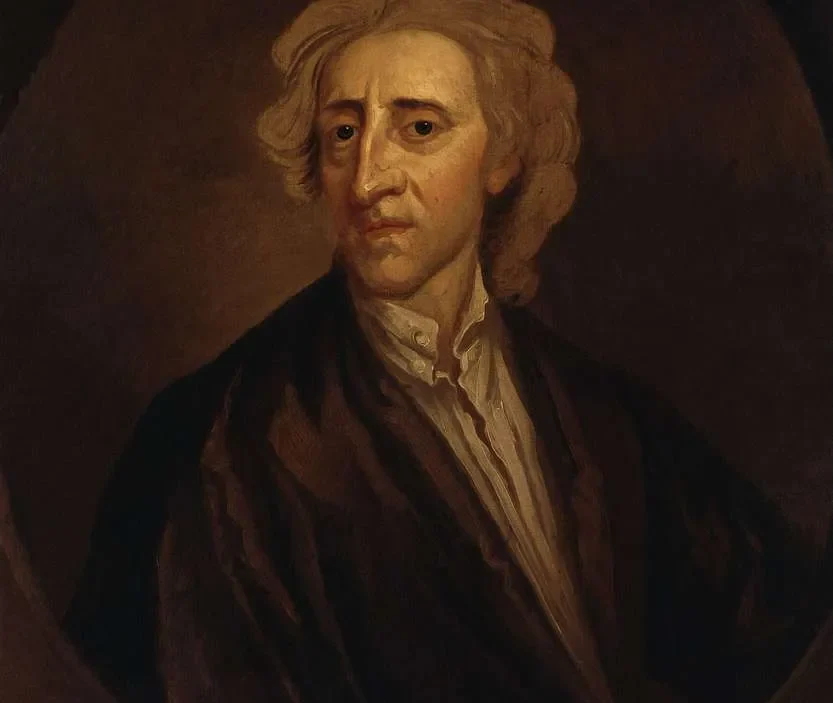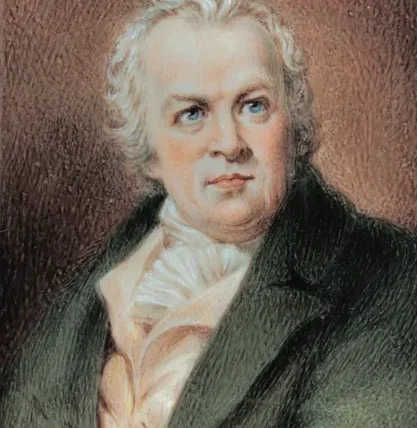Early Life and Education
John Locke, one of the most influential philosophers of the Enlightenment era, was born on August 29, 1632, in Wrington, Somerset, England. He belonged to a moderately wealthy family, and his father worked as a lawyer.
Although his birthplace was a small, rural village, Locke’s intellectual journey would take him far beyond those humble beginnings. In terms of his education, Locke began his studies at the Westminster School in London.
There, he demonstrated exceptional academic ability, particularly in Greek and Latin, which laid a solid foundation for his later studies in philosophy and political sciences.
After completing his education at the Westminster School, Locke went on to study at Christ Church, Oxford. At the time, Oxford University was renowned for its scholarly rigor and academic excellence. Under the guidance of esteemed thinkers, such as Robert Boyle and Thomas Willis, Locke developed a deep appreciation for the natural sciences and began to cultivate his philosophical inclinations.
Graduating with a bachelor’s degree in 1656 and a master’s degree in 1658, Locke’s time at Oxford provided him with an extensive and diverse education, which prepared him for the intellectual challenges that lay ahead.
Philosophical Influences and Background
John Locke’s philosophical ideas were greatly influenced by his diverse background and education. Born in 1632 in Wrington, England, Locke grew up in a politically and intellectually charged environment. His father, a small landowner and lawyer, instilled in him a strong sense of discipline and independence from an early age.
Locke’s education at Westminster School and then at Christ Church, Oxford, exposed him to a variety of philosophical and religious influences, shaping his intellectual development. At Oxford, he studied natural philosophy, mathematics, and medicine, which would later contribute to his holistic approach to understanding the world.
Moreover, his exposure to the works of prominent philosophers like René Descartes, Francis Bacon, and Thomas Hobbes significantly influenced his philosophical thinking.
Locke’s philosophical background, combined with the political events of his time, played a pivotal role in shaping his ideas about individual rights and government’s role in society. Living during the tumultuous period of the English Civil War and Glorious Revolution, Locke witnessed firsthand the tensions and struggles arising from conflicts between monarchs and the rights of the people.
These experiences, along with intellectual encounters at Oxford, solidified Locke’s belief in natural law and the importance of human reason. His immersion in the political debates of his time, alongside his philosophical explorations, laid the foundation for his development of influential theories on government, knowledge, and personal identity.
As we delve into his seminal works, the impact of Locke’s philosophical influences and background becomes evident in the depth and breadth of his ideas.
Locke’s Political Theory
Locke’s political theory was a significant contribution to the field of political philosophy. His ideas drew upon the concept of the social contract, which advocates for a voluntary agreement between individuals and their government. Locke argued that government exists to protect the natural rights of its citizens, such as life, liberty, and property.
He believed that people have the right to rebel against a government that violates these rights, further emphasizing the importance of consent and limited power in a political system.
One of the key aspects of Locke’s political theory is the principle of separation of powers. He advocated for the division of power among different institutions within a government, such as the executive, legislative, and judicial branches.
This system serves as a check and balance mechanism, preventing any single entity from obtaining absolute authority. Additionally, Locke’s theory placed an emphasis on the consent of the governed, arguing that legitimate governments are established based on the consent of the people they govern.
Locke’s political theory laid the foundation for many democratic systems and continues to be influential in shaping modern ideas of governance and individual rights.
The Two Treatises of Government
John Locke’s magnum opus, The Two Treatises of Government, stands as a pivotal work in political theory. The first treatise challenges the doctrine of divine right, establishing the fundamentally contractual nature of government.
Drawing upon natural law theory, Locke argues that political authority is derived from the consent of the governed. In this treatise, he also critiques the notion that monarchs possess unlimited power and advocates for the preservation of individual rights and liberties.
The second treatise delves deeper into the principles of government and explores the relationship between the ruler and the ruled. Locke posits that individuals enter into a social contract, voluntarily giving up certain freedoms in exchange for protection. However, this contract is contingent upon the government’s fulfillment of its obligations.
Should the ruler fail to uphold their end of the bargain, the people retain the right to dissolve the political ties and establish a new form of governance. Throughout this seminal work, Locke emphasizes the importance of limited government and the protection of natural rights, laying the foundation for modern liberal democracy.
Locke’s Theory of Knowledge
Locke’s Theory of Knowledge offers a significant contribution to the field of epistemology, the study of knowledge. Central to his theory is the concept of tabula rasa, or the blank slate.
According to Locke, the mind is born devoid of any innate ideas, and all knowledge is acquired through experience. He rejects the notion that knowledge is innate or predetermined, advocating instead for the idea that our understanding of the world is shaped by our sensory perceptions and reflections upon them.
In other words, knowledge is derived from our interactions with the external world, and is constantly evolving as we gather new experiences and insights.
Locke further developed his theory of knowledge by promoting empiricism and sensationalism. He argued that all knowledge is rooted in our sense perceptions and the ideas that arise from them.
For Locke, the mind begins as a blank slate, and it is through our senses that we are able to fill this slate with ideas. He emphasized the importance of observation and experimentation in acquiring knowledge, rejecting speculative reasoning and innate knowledge claims.
This marked a departure from earlier philosophical traditions that had relied heavily on rationalism and the belief in a priori knowledge. Instead, Locke emphasized the role of sense experiences in shaping our understanding of reality.
Tabula Rasa: The Blank Slate
Born in Wrington, Somerset in 1632, John Locke was a renowned philosopher and political theorist of the 17th century. His contribution to the field of epistemology was marked by his theory of tabula rasa, which translates to the “blank slate” in Latin.
According to Locke’s theory, the human mind at birth is devoid of innate ideas and knowledge. Instead, it is like an empty vessel that is gradually filled through sensory experiences and knowledge acquired from the external world.
Locke’s concept of tabula rasa had a profound impact on the understanding of human nature and the development of knowledge. It challenged the prevailing belief in innate ideas proposed by philosophers like René Descartes. By positing that individuals are born with a clean slate, Locke emphasized the role of the environment and personal experiences in shaping one’s understanding of the world.
This notion opened up avenues for further investigation into the nature versus nurture debate, influencing various fields such as psychology, education, and sociology. Locke’s theory of tabula rasa laid the groundwork for a new understanding of human cognition and the importance of empirical evidence in the pursuit of knowledge.
Empiricism and Sensationalism
Empiricism, a prominent philosophical theory, argues that all knowledge comes from sensory experience. It emphasizes the importance of observation and experimentation in understanding the world.
This approach rejects innate knowledge or ideas that are present in the mind from birth. Instead, empiricists contend that individuals are born as blank slates, or tabula rasa, and acquire knowledge through interactions with the external world. This perspective, championed by thinkers like John Locke, has significantly shaped our understanding of epistemology and scientific inquiry.
Sensationalism, on the other hand, places great emphasis on the role of sensations in our perception of reality. It posits that all mental processes, including our thoughts and ideas, derive from our sensory experiences.
For sensationalists, sensations are the fundamental building blocks of our consciousness, with more complex thoughts and concepts arising from combinations of these basic sensory elements. This philosophy gained traction during the Enlightenment period, thanks to notable philosophers such as Locke and George Berkeley.
Their ideas challenged traditional views on knowledge and paved the way for a greater appreciation of the role of the senses in shaping our understanding of the world.
Locke’s Theory of Personal Identity
John Locke, renowned philosopher of the 17th century, proposed a theory of personal identity that delves into the very essence of human existence. According to Locke, personal identity is not derived from a fixed, unchanging substance or soul, but rather from the continuity of consciousness. In other words, for Locke, personal identity is a result of our ability to retain memories and experiences over time.
He argues that as long as there is a continuous stream of consciousness connecting our present experiences with our past ones, we can consider ourselves to be the same person. This view challenges the traditional notion of an unchanging self and raises intriguing questions about what it means to be an individual.
Locke’s theory of personal identity centers around the concept of memory as the foundation of our identity. It asserts that our sense of self is closely tied to our ability to remember past events and experiences.
According to Locke, if we are unable to recall our past thoughts or actions, then our present self cannot be linked to our previous selves. This unique perspective suggests that our personal identity is not fixed or determined by any inherent traits but instead depends on a continuous chain of consciousness. Locke’s theory opens up thought-provoking discussions about the nature of identity and how our memories shape our understanding of who we are.
Religious Toleration and Separation of Church and State
John Locke, the renowned philosopher of the 17th century, was a staunch advocate for religious toleration and the separation of church and state. His writings on this subject have had a profound impact on the development of modern democracy and the principles of religious freedom.
Locke firmly believed that the government should not meddle in religious affairs and that individuals should have the freedom to practice their chosen faith without fear of persecution or coercion. This was a revolutionary idea at a time when religious conflicts and tensions were rampant across Europe.
Locke’s stance on religious toleration can be traced back to his fundamental belief in the right to individual liberty. According to Locke, one’s religious beliefs were a deeply personal matter and should be entirely free from any interference or control by the state. He argued that the government’s role was limited to protecting the basic rights and freedoms of its citizens, including their freedom of conscience and religion.
This meant that the state should not favor any particular religion or impose any religious laws that would infringe upon the rights of those who held different beliefs. Locke’s ideas laid the groundwork for the principle of religious freedom and the separation of church and state, which have become integral parts of modern democratic societies.
Locke’s Views on Education
Locke’s ideas on education were deeply rooted in his belief in the potential of the human mind. According to Locke, education played a crucial role in shaping individuals’ moral character and intellectual abilities. He emphasized the importance of a well-rounded education that fostered the development of both reason and virtue.
For Locke, education should not only focus on the acquisition of knowledge but should also instill values such as honesty, humility, and tolerance. He believed that children should be taught self-discipline and critical thinking skills from an early age.
Moreover, Locke emphasized the significance of hands-on learning and believed that children learn best through personal experience and interaction with the world around them. This approach to education, centered on nurturing the individual’s potential, had a lasting impact on the development of educational systems around the world.
Locke’s Influence on American Founding Fathers
Born on August 29, 1632, in Wrington, Somerset, England, John Locke was a prominent English philosopher whose ideas greatly influenced the American Founding Fathers. Locke’s writings on natural rights, government, and individual liberty played a significant role in shaping the ideological foundation of the United States.
His ideas had a profound impact on the formation of American democracy and the principles that guided the Founding Fathers in their quest for independence and the creation of a new nation.
Locke’s belief in the concept of natural rights, which included the rights to life, liberty, and property, resonated with many American colonists who were seeking freedom from British rule. His argument that governments are created to protect these inherent rights and derive their authority from the consent of the governed directly influenced the drafting of the Declaration of Independence and the creation of the American system of government.
Additionally, Locke’s philosophy of limited government and the idea that individuals possess the right to revolt against oppressive rulers provided a strong intellectual foundation for the American Revolution and the subsequent establishment of a constitutional republic.
The Founding Fathers looked to Locke’s ideas on individual freedom, limited government, and the right to govern through elected representatives as they crafted the American system of governance, making his influence on the American Founding Fathers unmistakable.
Locke’s Economic Ideas and Free Market Capitalism
One of the significant contributions of John Locke to political philosophy is his promotion of free market capitalism and his economic ideas. Locke believed in the importance of individual property rights and the role of the market in promoting economic prosperity. He argued that individuals have a natural right to acquire and own property, which is essential for their liberty and self-preservation.
Locke’s ideas on free market capitalism emphasize the importance of limited government intervention in economic affairs, as he believed that the market would naturally regulate itself and promote growth and innovation. His support for private property and free trade laid the foundation for the development of capitalist economies and greatly influenced the economic systems of many nations.
Locke’s belief in the virtues of free market capitalism was grounded in his broader philosophical principles. As an empiricist, Locke believed in the power of reason and observation to understand the natural world and human behavior. He argued that individuals, by pursuing their own self-interest in a free market, would contribute to the overall well-being of society.
Locke also rejected the idea of a “blank slate” or tabula rasa, asserting that individuals have inherent natural rights, including the right to own and trade property. His economic ideas, combined with his understanding of human nature and natural rights, provided a philosophical basis for the development of modern capitalist economies and the promotion of individual liberty and prosperity.
Locke’s Views on Natural Rights and Property
Locke’s views on natural rights and property are central to understanding his political theory. According to Locke, every individual has three fundamental natural rights: life, liberty, and property.
He believed that these rights are inherent in every human being and cannot be taken away by any external authority. In his renowned work, “The Second Treatise of Government,” Locke argued that the purpose of government is to protect these natural rights.
Furthermore, Locke considered property ownership as an essential aspect of human existence. He believed that through their labor, individuals transform natural resources into personal property. In his theory, the acquisition of property is justified by the mixing of one’s labor with the unowned resources of nature.
Locke emphasized that the right to property is not only crucial for personal freedom but also for the overall prosperity of society. He proposed that a just government should secure and enforce private property rights, thereby promoting economic growth and social stability. Through his views on natural rights and property, Locke laid the foundation for the development of liberalism and individualism as key principles of political philosophy.
Locke’s Impact on Liberalism and Liberal Democracy
Locke’s impact on liberalism and liberal democracy cannot be overstated. His philosophy paved the way for the development of individual rights, limited government, and the protection of personal freedoms. Locke’s ideas were instrumental in shaping the political landscape of the Enlightenment era and continue to influence contemporary democratic societies around the world.
Arguably one of Locke’s most significant contributions to liberalism is his belief in the social contract. He argued that governments derive their power from the consent of the governed and that the primary purpose of government is to protect the natural rights of individuals, namely life, liberty, and property. This notion of limited government and the idea that citizens have a right to rebel against unjust rulers became a cornerstone of liberal democracy.
Moreover, Locke’s emphasis on the separation of powers and checks and balances heavily influenced the systems of governance in countries such as the United States, where the executive, legislative, and judicial branches are designed to prevent any one body from becoming too powerful. Locke’s belief in the fundamental value of individuals and their rights laid the foundation for the development of liberal democratic principles that prioritize freedom and equality for all.
Legacy and Criticisms of Locke’s Philosophy.
One of the key legacies of Locke’s philosophy is its profound influence on the development of modern liberal democracy. His ideas on natural rights, limited government, and the social contract laid the foundation for the concept of individual freedom and the idea that governments exist to protect these rights.
Locke’s emphasis on the consent of the governed and the right to revolution also played a crucial role in shaping the principles of democratic governance. His theories continued to inspire and inform political thinkers and leaders throughout history, including the American Founding Fathers who drew heavily from his ideas when drafting the United States Constitution.
However, Locke’s philosophy is not without its criticisms. Some argue that his theory of knowledge, particularly his belief in the primacy of experience and sensory perception, neglects the importance of innate ideas and the role of reason in human cognition. Others question the feasibility and practicality of his social contract theory, highlighting the challenges in defining and enforcing natural rights.
Additionally, Locke’s views on property rights have been criticized for their tendency to prioritize the accumulation of wealth, potentially leading to inequality and exploitation. Despite these criticisms, the enduring impact and ongoing relevance of Locke’s philosophy cannot be denied, as his ideas continue to shape our understanding of political, social, and philosophical discourse.








